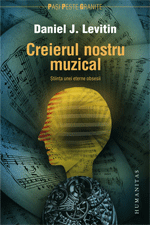> Books about music

'This Is Your Brain on Music' by Daniel Levitin
I must say that This Is Your Brain on Music is one of the most relevant books I have read in a while, a book that managed to give me answers and scientific proof over things that I have only had an intuitive comprehension on.
Why do we enjoy music, after all?
…is the question Levitin asks himself. What is the main-spring that has brought the musical industry to be, at least in America, one amongst those with the highest business figures, what drives us to go to a concert for which two tickets cost the equivalent of a week's food, or buy a CD that amounts to more than our phone bill?
The scientific proof Levitin has gathered brings to light the fact that, when we listen to music, essential parts of our brain become innerved: the auditory cortex, the frontal lobe, the mesolimbic system, the cerebellum and the basal ganglia, which translate into a rise in the levels of dopamine and emotional balance - meaning that, by listening to music, we improve our disposition, as music has an antidepressant effect. Moreover, according to Levitin 'music appears to imitate certain traits of the language and transmits some of the emotions aroused by verbal communication, but in a non-referential and non-specific manner. Also, it ignites one of the language neural zones, but even more than language, music turns to the primitive cerebral structures that play roles in motivation, reward and emotion. When we like a musical piece, it reminds us of music we have listened before and activates in our memory traces of the emotional charged moments of our life.'
How does one become a good musician? Levitin's studies come to show us that good musicians are those who have practiced long enough - over ten thousand hours - and this applies in fact to any competency and profession, in which one should become known as a world class expert.
Why do we like a certain kind of music?
Levitin refers to studies that come to demonstrate that even since our new-born days, our brain is able to distinguish between consonant and dissonant areas and tends to prefer the consonant ones, proof being that any new-born favours first and foremost the western classical music, no matter the culture in which he had been born into. The taste for a certain kind of music develops between the ages of ten and fourteen and consolidates by eighteen to twenty years of age, the scientific explanation of this being that throughout this time our emotional experiences are most intense and mark the moment of our neural maturity. Since this is a connection between synapses, it can be expected that changes in preferences may happen with reaching maturity in age, but the probability is significantly lower in comparison to a brain in its process of development.
What music should sound like in order to please the human brain
Levitin writes: 'music - as any other form of art - must find the right balance between simplicity and complexity. Simplicity and complexity are related to custom and custom is nothing more than a synonym for pattern' - and we all know, I add - that the human brain rationalizes on patterns.
It seems that music is intimately connected to the genetic evolution of humankind. To draw an example, the one who used to hold onto the advantage of music or creativity would also be the one more successful with the opposite sex, thus the possibility of imposing his genes - in fact something that today we are able to recognize in the assaulting behaviour of a rock star's fans. The importance of music in the evolution of humankind has also to do with the developing of language and the mental structures designed for using language - instinctively, we have all sung to our babies before teaching them how to talk.
In this way, you may now better understand how music is an essential part of our brain and we should be able to find answers, at least where the education of our children is concerned.
I admit that the translation of Daniel Levitin's first book, the one relating to musical theory, may not be the best yet. But be assured that the second part will reveal to you a fascinating read on 'our brain on music'.
Translated by Alina Popa
MTTLC, Bucharest University














